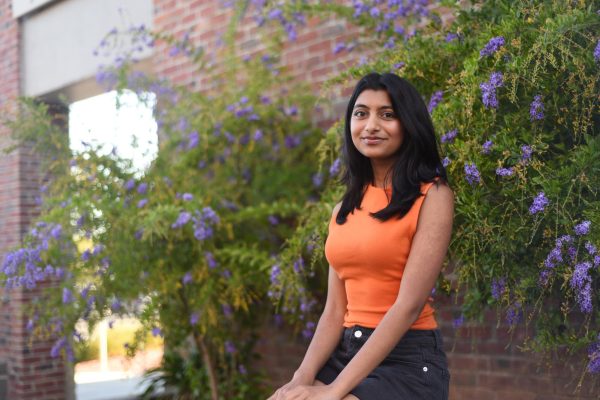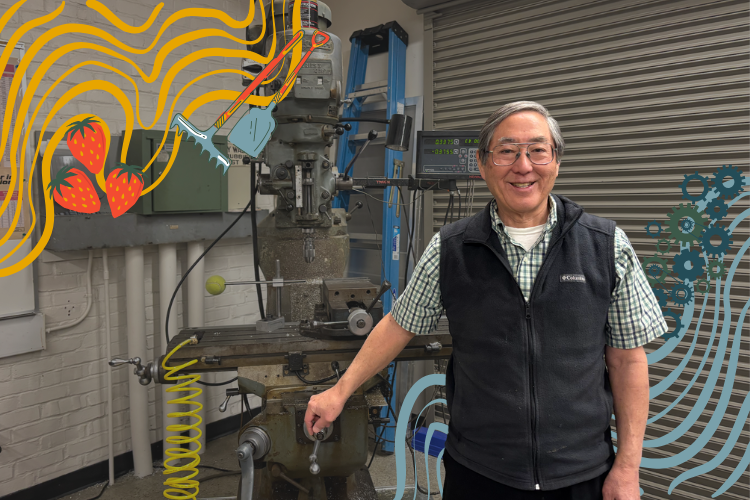EE: Hey there, I’m Samika Bhatkar! Thanks for tuning in today. I’ll be sitting down with Lofn Young, the Vocal Music Director and Music Department Chair to talk about their personal journey of changing their name.
EE: Why did you decide to change your name?
LY: So it’s been a lifelong journey of wanting to and never really identifying with my own name. I’ve always kind of felt, I think this is just kind of from a personal philosophy standpoint, I think it’s weird that we don’t name ourselves, that somebody else decides what you’re going to be called for your life. I just have a lot of thoughts about identity in childhood, and letting kids have a little bit more say in who they are sooner in their life. Because I think there are a lot of detrimental effects sometimes to not letting a kid be their authentic self and have that kind of autonomy. So growing up in a pretty homogenous community that was not very tolerant of queerness, I didn’t really get to grow up with that authentic identity. And it took growing up, educating myself, moving away from that place and coming to a place where I was actually allowed to explore my identity before I really got to feel like I had the agency to make those kinds of decisions for myself. It just took a lot of self-exploration and being able to finally do that identity work to kind of come to, “Who am I? Who do I feel like I am? Who is that in those pictures of me? Who is that looking back in the mirror?” And just kind of letting myself decide what I’m going to be called.
EE: How did you choose this name?
LY: So I chose this name because I knew that I wanted something due to my gender identity. I wanted something that presented relatively gender-neutral upon sight, and just not necessarily having a connotation of gender. So I had a short list going for a while. I had kind of bounced around between different names, and it took a while until about a year ago, I found the name Lofn, and that was a really unusual name. I’ve never met anyone named Lofn before, and so I looked up what it meant, and sat with it for about a year until I was finally like, “Yeah, this is the one that feels good,” and it has consistently felt good, and “I think I’m ready to try this out.” So over the summer, I had my closest friends kind of start using it with me, and kind of feeling out how that went. And I said, “Yeah, this feels good, so I’m going to go ahead and make it official and make it public.” And I started cheering. And I was definitely very apprehensive about a name change, especially at my age. I feel like it’s a little bit more unusual for folks in their later adult life, folks in their thirties to change their name. I feel like it’s definitely something that, thankfully, is happening at a younger age, and folks are able to have that permission to do that. I was a little bit apprehensive about the response and the willingness of my peers and my colleagues to be supportive there, and I have been very, very happy with how everyone has been so incredibly supportive and jumped in immediately and are engaging with me on it. And it’s been really positive.
EE: How does it feel to go by Lofn Young now?
LY: Yeah, it feels really good. I was literally just even walking in today, just with a smile on my face, just being able to show up as my full authentic self and say, “Wow, I’m so happy to be in a place where I feel like I can show up as Lofn” and just be really happy with that. I think I’ve come to a place in my own identity and in my own personality that I feel confident enough to be myself regardless of what other people think, and I think that takes everybody sometimes a long time to get to that point where they’re able to just thrive in that authentic space.
EE: And then, prior to changing your name, how did you get to this kind of stage where you could embrace your authenticity? Like, what steps did you take to fully get to where you are now?
LY: It takes a lot of steps. There’s a lot of self-reflection. There’s a lot of difficult work involved in that. And I’m really, again, very, very grateful to be in a space where I felt allowed to explore that and give myself permission to really let go of expectations, connotations, etc. So I think part of it was through the identity work that I was doing and kind of coming into really learning myself. And I think first was the gender work and changing my pronouns, and then kind of feeling like, yeah, my name and my pronouns don’t really jive. And, again, never really having felt very attached to my first name. It’s always been on my list, I think in the back of my head, of “Yeah, this would be something that if I got to just snap my fingers and change,” and it’s like, “Well, I guess I kind of can do that.” You come to a point where you just got to decide, “Yeah, I’m going to change this.”
EE: Yeah, how did your family and/or friends react to your name?
LY: So I’m not currently in contact with my family so they don’t actually know that I’ve changed my name. We’ll see if that ever comes up. My friends have been incredibly supportive. My friends are my chosen family, and having their support and their encouragement and their love is everything.
EE: How important do you think it was for your process to have that kind of support system?
LY: I mean, pretty integral, because it was clear that I wasn’t really able to stand on my own and stand in that decision when I wasn’t surrounded by support for it, so it made it a lot harder earlier and a lot easier now that I do have that support and that community to lean on. I think our community in general, in the Bay Area, it’s definitely a lot more normalized and accepted and supported. So again, I’ve had a lot of really positive interactions as a result, and I think it’s been really affirming in my relationships, to see the support and to see the willingness to show that support. I’m kind of calling it a stage name right now, because I think in the performance world, it’s something people can really grasp, especially older folks that I’m working with. And I do plan to legally change it in the future because I’m engaged, so I’m going to just wait till the marriage paperwork happens.
EE: Congratulations.
LY: Thank you. So, yeah, I think it’s been nothing but affirming. And I think also the few times that there has been someone with questions and curiosity, it’s not been from a judgmental place. It’s been from a place of curiosity. And I’m really open to talking about my journey with folks because I really want my story to be out there in case somebody else is struggling with this. Other adults on campus have asked me, “Oh, why did you decide to change your name?” and I’m just really open with talking to them about that process and helping them come to a better understanding. Because maybe they’ve never gotten to interact with someone like me before.
EE: And from your experience, what is some advice you would give someone who is thinking about changing their name but they’re stuck in a situation like how you said earlier, where they don’t feel like they’re in a safe space to express that?
LY: My advice would be to change your environment as soon as you have the ability to do so because when we talk about depression and mental health, the most common element to someone’s mental health being bad is someone being in a bad environment. And if you’re able to change your environment, then you’re able to change that. Ultimately, I’m really, really happy that I did. I would definitely not trade back. It’s definitely worth it, and it gets better. It gets better.















